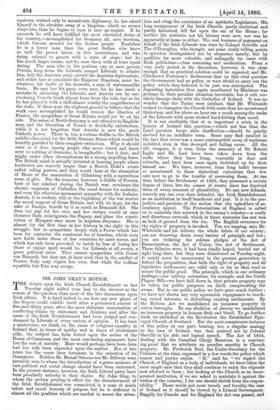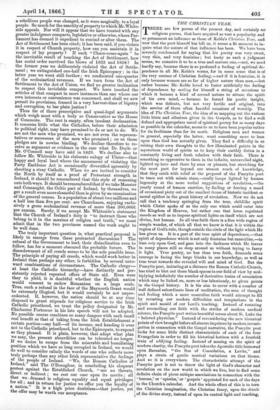SIR JOHN GRAY'S MOTION. T HE debate upon the Irish Church
Establishment on last Tuesday night added even less to the interest or the reason of the question than most of the late discussions upon Irish affairs. It is hard indeed to see how any new phase of the dispute could exhibit itself after a protracted contest of five-and-thirty years, after the most elaborate examination of conflicting claims by statesmen and thinkers, and after the cause of the Irish Establishment had been judged and con- demned by Liberals of every variety of opinion. It has been a misfortune, we think, to the cause of religious equality in Ireland that, in times of apathy and in times of excitement alike, the subject has been forced upon the notice of the House of Commons, and the most convincing arguments have lost the test of novelty. More would perhaps have been done had less talk been expended upon the matter. Nor of late years has the cause been fortunate in the selection of its champions. Neither Mr. Bernal Osborne nor Mr. Dillwyn were precisely men to whom the introduction of a grave measure of vast political and social change should have been entrusted. In the present instance, however, the Irish Liberal party have been peculiarly unlucky in their choice. Sir John Gray, to whom the motion praying in effect for the disendowment of the Irish Establishment was committed, is a man of much talent and much honesty of purpose, but he is deficient in almost all the qualities which are needed to arrest the atten- tion and sting the conscience of an apathetic Legislature. His long arraignment of the Irish Church, partly statistical and partly historical, fell flat upon the ear of the House ; for neither his statistics nor his history were new, nor was he apparently at home in either. The real business of argument on behalf of the Irish Liberals was done by Colonel Greville and The O'Donoghue, who brought out some really telling points in speeches distinguished not by eloquence merely, but by qualities far more valuable, and unhappily far rarer with Irish politicians—close reasoning and moderation. From a very early period in the discussion, however, it was clear enough that no practical solution could be expected, and Mr. Chichester Fortescue's declaration that on this vital question the Government had no policy, or were afraid to carry out the policy which they believed to be just, was anticipated. The degrading indecision thus again manifested by Ministers was perhaps in their peculiar situation inevitable, but it will cer- tainly damage them with the Catholics of Ireland. It was no wonder that the Tories were jubilant, that Mr. Whiteside rushed to champion the Church with more than his accustomed Quixotism, and for above an hour ran a muck among the ranks of the Liberals with more wicked hard-hitting than usual.
It is not creditable that at so important a crisis in the history of Ireland this question—which not less than the Land question keeps alive disaffection—should be quietly shelved for an indefinite term. Some may find comfort in the fact that never was a more contemptible array of sophisms unfolded, even in this decrepid and failing cause. All the old weapons, it is true, from the armoury of Sir Robert Inglis and Mr. Law have been taken down from the racks where they have hung, venerable in dust and cobwebs, and have been once again furbished up for their annual use. We have, however, from long habit become so accustomed to these dialectical curiosities, that few care now to go to the trouble of answering them. At one time, before the Settlement of 1829, they possessed a certain degree of force, but the course of events since has deprived them of every remnant of plausibility. No one now defends, scarcely any one even then defended, the Irish Establishment as an institution in itself beneficent and just. It is to the pre- judices and passions of the nation that the upholders of as- cendancy appeal. The Protestantism of England is called on to maintain this outwork in the enemy's country—a costly and disastrous outwork, which in three centuries has not won an inch of ground from the foe. The English reverence for the rights of property is invoked. You are sapping, says Mr. Whiteside and his fellows, the whole fabric of our society ; you are throwing down every barrier of principle and law ; you are violating the solemn pledges of the Act of Emancipation, the Act of Union, the Act of Settlement. These fallacies were, it had been fondly hoped, buried out of sight long since, but they were disinterred on Tuesday night. It surely must be unnecessary in the present generation to defend the proposition, that both the right of property and all legislative settlements are valid only so far as they tend to secure the public good. The principle, which in our ordinary dealings—our railway extensions, for example, and the Cattle Plague Bill—we have laid down is, that private property may be taken for public purposes on fairly compensating the owner. But in our public policy we have gone much further : we have not shown any very squeamish repugnance to touch- ing vested interests, to disturbing existing settlements. By the Reform Act we annihilated an immense property in rotten boroughs. By our abolition of slavery we annihilated an immense property in human flesh and blood. To go further back, we abolished at the Revolution the Established Epis- copal Church of Scotland. But the most conspicuous instance of this policy on our part, bearing, too, a singular analogy to the case of Ireland, was that pointed out by Colonel Greville in his able and logical speech. The Act of 1854, dealing with the Canadian Clergy Reserves, is a convinc- ing proof that we attribute no peculiar sanctity to Church property. Mr. Frederick Peel, the Under-Secretary for the Colonies at the time, expressed in a few words the policy which reason and justice enjoin. "If," said he, "we regard the Church of England as a body of individuals, we have taken the most ample care that they shall continue to enjoy the stipends now allotted to them ; but looking at the Church as an incor- porated institution, if we are asked to maintain it against the wishes of the country, I for one should shrink from the respon- sibility." These words put most tersely and forcibly, the case of Ireland as it should be viewed by a Liberal Government. Happily for Canada and for England the Act was passed, and a rebellious people was changed, as it were magically, to a loyal people. So much for the sanctity of property to which Mr. White- side appeals. Nor will it appear that we have treated with any greater indulgence compacts, legislative or otherwise, where Par- liament has deemed it expedient to rescind or alter them. The Act of Settlement has been cited; it has been said, if you violate it in respect of Church property, how can you maintain it in respect of lay property If such " Chaos-come-again " be the inevitable result of touching the Act of Settlement, how has social order survived the blows of 1833 and 1838? In the former year we deliberately violated the Act of Settle- ment; we extinguished one-half the Irish Episcopacy ; in the latter year we went still further ; we confiscated one-quarter of the ecclesiastical revenues. If we turn from the Act of Settlement to the Act of Union, we find no greater inclination to respect this inviolable compact. We have touched the articles of that compact in more instances than one where our own interests or convenience was concerned, and shall we now permit its provisions, framed in a very harvest-time of bigotry and corruption, to bar plain justice? Thus far of those prescriptive and quasi-legal arguments which weigh most with a body so Conservative as the House of Commons. The rest is empty, often insolent declamation. It concerns little what the Catholics, before their admission to political right, may have promised to do or not to do. We are not the men who promised, we are not even the represen- tatives or successors of the men who promised ; on us those pledges are in nowise binding. We decline therefore to re- ceive as argument or evidence in the case what Dr. Doyle or Mr. O'Connell may have said in 1829. We decline also to follow Mr. Whiteside in his elaborate eulogy of Ulster—that happy and loyal land where the amusement of violating the Party Emblems Act is occasionally diversified agreeably by shooting a stray Catholic. When we are invited to consider the North by itself as a proof of Protestant strength in Ireland, it should be remembered that this style of reasoning cuts both ways. It should be remembered that if we take Munster and Connaught, the Celtic part of Ireland, by themselves, we get a result even more shameful than is given by an examination of the general census. In a population of about two millions and a half less than five per cent. are Churchmen, enjoying exclu- sively a gross ecclesiastical revenue of more than 300,000/. per annum. Surely, if we accept Mr. Whiteside's statement that the Church of Ireland's duty is "to instruct those who belong to it in the maxims of religion and truth," we must admit that in the two provinces named the work ought to be well done.
The truly important question is, what practical proposal is likely to emerge from these protracted discussions ? The refusal of the Government to lead, their disinclination even to follow, has for a moment obscured the probable future. The disendovvment of all creeds seems to be the sole possible issue. The principle of paying all creeds, which would work better in Ireland than perhaps any other, is forbidden by several unto- ward combinations of circumstance. The Catholic clergy— at least the Catholic hierarchy—have distinctly and per- sistently rejected repeated offers of State aid. Even were they to yield, it is doubtful whether the English nation would consent to endow Romanism on a large scale. True, such a refusal in the face of the Maynooth Grant would be extremely illogical, but it would certainly be not unpre- cedented. If, however, the nation should be at any time disposed to grant stipends for religious service to the Irish Catholic priesthood, we trust the policy designated by Mr. Chichester Portescue in his late speech will not be adopted. No possible course combines so many dangers with such small real benefit as that of taking from the Irish Establishment a certain portion—say half—of its income, and handing it over not to the Catholic priesthood, but to the Episcopate, to expend as they pleased. It is plain, however, that adopt what plan we may, the present absurdities can be tolerated no longer. If we desire to escape from the miserable and humiliating position which we have so long occupied in Ireland, we would do well to consider calmly the words of one who reflects more truly perhaps than any other Irish representative the feelings of the people of Ireland. "We, the Roman Catholics of Ireland,' said The O'Donoghue, in concluding his eloquent protest against the Established Church, "use no threats, direct or indirect ; we rest our case upon its merits all that we. demand is religious equality and equal privileges for all ; and in return for justice we offer you the loyalty of a nation." It is a high price doubtless—that justice, yet the offer may be worth our acceptance.































 Previous page
Previous page